#unnumbered
Explore tagged Tumblr posts
Text
How to draw Dragon Wings


Credit: Etherington Brothers
#unnumbered#dragon#dragons#dragon wing#dragon wings#wings#wing#flying#creature#creatures#animal#animals#animal anatomy#monster#monsters#reptile#tip#art tutorial#drawing tip#art tip#art tips#art tutorials#drawing#drawing tips#drawing tutorial#drawing tutorials#art#mythical#fantasy#mythical creature
248 notes
·
View notes
Text
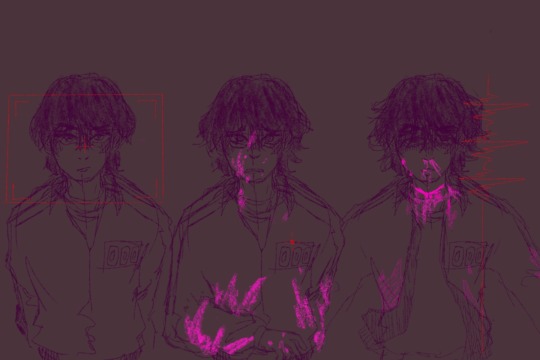
Squid game got me in a chokehold so have some unnamed oc who dies!
#squid game#squid game oc#character art#oc art#squid game2#artist of tumblr#procreate#unnumbered#because I can’t choose#like seriously I had 456 options
3 notes
·
View notes
Text
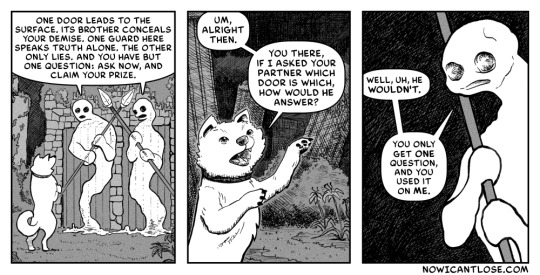
Unnumbered #102 The Riddle
Visit the website!
Join the mailing list for weekly updates!
Get the books!
4 notes
·
View notes
Text
Probably one of the Devil's greatest lies is the image of hope as something fleeting and ephemeral. It ties into the lie that you have to effortlessly feel something for that feeling to be real. Just because I don't feel like there's gravity, or just because I can't see the movement of the floor as the world whirls endlessly through space, doesn't mean that those things aren't there, and the same can be said for things like hope.
Hope isn't just some flighty butterfly, something fragile and wispy. Hope is the woman praying daily at her husband's side in the hospital, waiting for him to wake and wondering if he'll remember her after his head injury.
Hope is the sailor clinging to the helm in the teeth of a gale, riding it out because he hopes and knows that the storm cannot last forever.
Hope is Samwise storming the tower of Cirith Ungol, not knowing whether he can truly overcome the orcs in the tower, but hoping that he can help his Master Frodo in some way at least.
Hope is the last stand of Húrin the Steadfast: holding the gap against the forces of Morgoth in Nirnaeth Arnoediad, the Battle of Unnumbered Tears, swinging his axe as he and his kinsmen fight to the death to protect the retreat of Turgon and the elves of Gondolin, shouting with each swing, "Aurë entuluva! Day shall come again!"
Hope is not something fleeting, something ephemeral. It can become such, because like any other emotion or feeling, it needs cultivation. But if you cling to it, if you hold it tight, then it will grow. If you let it, hope is a fighter, a shieldwarden, a warrior. Hope is not simple platitudes, but a knowledge that whatever things might feel like, the truth of the matter is different—no matter how hopeless things seem, things will not stay that way.
#my words#thoughts#philosophy#hope#J. R. R. Tolkien#Tolkien#Tolkien Legendarium#The Tolkien Legendarium#Quenta Silmarillion#The Silmarillion#Silmarillion#The Lord of the Rings#Lord of the Rings#LotR#Samwise#Samwise Gamgee#Frodo#Frodo Baggins#Tower of Cirith Ungol#Cirith Ungol#Nirnaeth Arnoediad#Battle of Unnumbered Tears#Hurin#Hurin Thalion
347 notes
·
View notes
Text
Silm reread 18: Tears Unnumbered ye shall shed
So, we got here. But first, B&L get an epilogue.
First, a tidbit about reembodiment: B&L take their physical forms again in Doriath. I guess they go from Mandos to there in spirit. (It's all "allegedly", anyway). Everyone is happy and afraid when seing them (very reasonable reaction I think) and Luthien heals Thingol from (depression, more or less).
Melian looks in Luhien's eyes and is sad. She "realized they will be apart till the end of the world and after" (huh?) and again, we have Pengolodh's favorite stylistic tool: "nobody ever suffered more from any loss than Melian suffered then".
Oh, I found the quote in original: “But Melian looked in her eyes and read the doom that was written there, and turned away; for she knew that a parting beyond the end of the world had come between them, and no grief of loss has been heavier than the grief of Melian the Maia in that hour."
B&L go to Ossiriand, it vaguelly feels like they don't neet to eat anymore? But unclear.
Anyway, back to the proper plot Feanorians. Maedhros gained hope, because he saw Morgoth is not untouchable. He starts creating the Union, but the wording about him doing it … even without knowing the story, if I read it carefully, I would probably be worried about how it will go.
And we have a clear reminder of the Oath and all that. Orodreth doesn't trust the Feanorians because C&C (makes sense I guess) (Finrod would probably join the Union but anyway). Gwindor joins Maedhros, going against his king's orders… we know how this will end for Gwindor.
doriath. Mae&co had sent brash letters to thingol along the lines of "you will be our enemy if you don't give the Silmaril back" and Melian advised Thingol to give it to them! But he is angry at their tone and at C&C, and also B&L have suffered so much for this jewel…
Sidenote: If your main claim to a piece of treasure is "but I/someone have sufferred so much", keeping it is probably going to end badly.
Also thingol wants to keep the Silmaril, because it is this jewel's power…. wait what? "And every day that he looked upon the Silmaril the more he desired to keep it for ever; for such was its power." [original] WHAT.
Ok, that is new. So, the Silmaril is canonically addictive? Or is it only because it has been in Morgoth's crown?
So, anyway, Thingol sends Maedhros a dissing answer and Maedhros leaves him be, because the Union is more important. Yay, Maedhros, great job, you are doing well! (For now :((( )
Unfortunately C&C threathen Thingol with genocide, after they win the wart. Which they assume they will. So thingol fortifies and doesn't go to the war. (Mablung and Beleg go, but Thingol allows them reluctantely, so they end up better than Gwindor)
Bór! :) and Ulfang :(
Maedhros plays his hand a bit too early :(
Also, another mention of Morgoth's spies (plural) and traitors. So, I guess the fallen Men, enslaved Elves and shapeshifting wannabe-Saurons sabotage the Union as much as they can.
Battle, Fingon doubtful, problems, suddenly: Turgon! First good surprise of this battle (it will be a whiplash…)
The Noldor want to charge too quickly, but Hurin stops them, because he is wise.
Morgoth wants to kill Fingon especially. Why? Probably to break Maedhros. (Also, revenge for the rescue, maybe.)
Gwindor gets unlucky chance (that's what happens when you go to war against your king's orders, I suppose)
The Noldor get really motivated and almost win. Morgoth is trembling of fear XD as they bang at his door. This is pretty cool of them. But then they all die. :(
Another turn: the Noldor might have won, but Ulfang. :( [Maglor kills him and it's probably the only named character that we are told is killed by Maglor, which is interesting]
Also, Glaurung is there.
Fingon dies. Also, his banner is silver and pale blue, which I did not remember.
Hurin, Turgon, foreshadowing for Earendil. Maeglin hears it all, but does not comment, and he remembers it and I have no idea why the book tells us that, this line feels so odd. "Maeglin, Turgon's sister-son, who stood by, heard these words, and did not forget them; but he said nothing" It's apparently odd to more people because there's a reddit thread about it. huh, ok, makes sense.
So, Hurin is brave and great and I will need to make a post about how the story is an ecosystem and the benefit of one character's heroics sometimes lands to another character's lap and it's painful but also quite real. So. Hurin. But we'll get back to him later.
Morgoth is happy, because divides and betrayal and stuff like that. :/
Also this (Ulfang) is why the Elves don't like Men anymore (except the Edain).
Cirdan is besieged, allo we learn that there are Orcs who can use explosives, and orkish engineers and what not. Interesting. they destroy the ports, Cirdan&co escape to the sea and to Balar.
Turgon again sends ships to Valinor, again it doesn't work (again I suppose he didn't ask Ulmo about his opinion or ignored it), and we are told who kills those sailors: not the Valar. "Only one, Voronwe, was saved by Ulmo from Osse's wrath". So yea, it's the "not rebel, but not not-rebel" sea guy. Don't blame the Valar for this.
Turgon is the rightful king of the Noldor (says the book), Morgoth hates him, because Fingolfin, and because he's a friend of Ulmo, and because Turgon's vibe scares him. We have a wonderful line about how even back in Valinor Morgoth was anxious every time he saw Turgon and tbh this is criminally underexplored in fics (this whole period is) and must have been quite hilarious.
Hurin disses Morgoth, Morgoth curses him and his wife and kids, takes him high up, and curses him again for a good measure.
Results of that: in the next chapter.
#silm#silmarillion#tolkien legendarium#the silm#the silmarillion#silm reread#battle of unnumbered tears#nirnaeth arnoediad#turgon#fingon#maedhros#gwindor#hurin#bor the faithful#beren and luthien#eri reads the legendarium
61 notes
·
View notes
Text
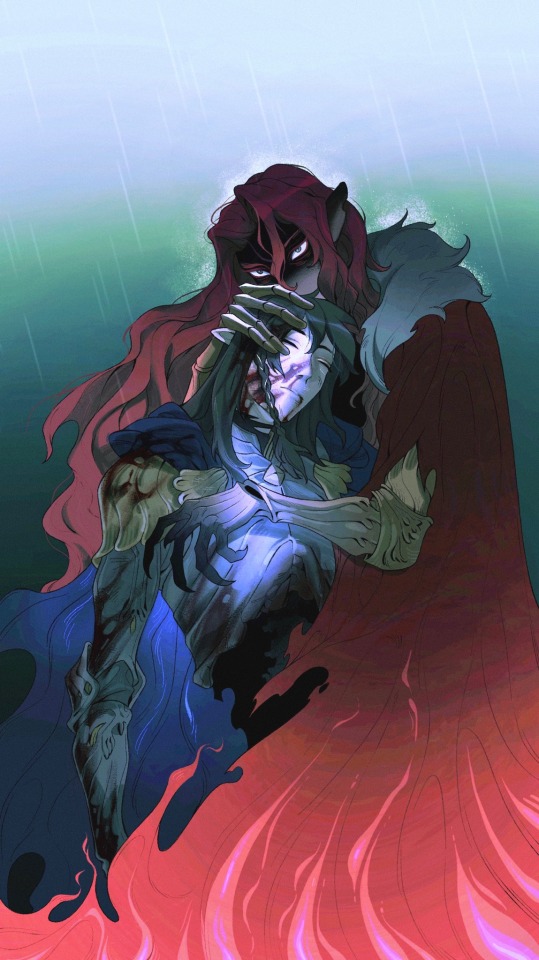
A part of him died that day
757 notes
·
View notes
Text
I Read The Silmarillion So You Don't Have To, Part Nine
Previous part.
Chapter 20: Of the Fifth Battle: Nirnaeth Arnoediad In which Maedhros tries and fails to get the Elves to play nice, and then a battle goes very badly.
This chapter begins with a quick account of what happened to Beren and Lúthien. They are restored to life, and briefly check in on Lúthien’s parents in Menegroth. It had been eternal winter in the forest of Doriath since Lúthien died, but Lúthien brings spring with her. When Melian sees her daughter, it’s like seeing a ghost. Melian feels the most horrible grief that anyone has ever felt in the history of the world, because Lúthien is mortal now. The Elves call Beren and Lúthien “The Dead that Live,” because there’s something deeply unnatural about coming back from the Halls of Mandos. All the Elves are unsettled by them, so Beren and Lúthien go off on their own, into the east of Beleriand. They have a son, Dior Aranel, but beyond that, the Elves never hear of them again. Presumably they live out their natural lives, but no one knows when they died or where they’re buried
That’s the end of that story! Now, let’s return to the Main Plot. Maedhros, the oldest of Fëanor’s sons (the one who lost a hand) has been thinking up new ways to fight Morgoth. Fingolfin proved that Morgoth is not invincible — he can be hurt, so maybe he can be killed, or at least incapacitated enough to stop causing trouble. However, the Noldor don’t stand a chance unless they can band together and fight Morgoth as a unified front. Maedhros tries to call all the Elves together in a council.
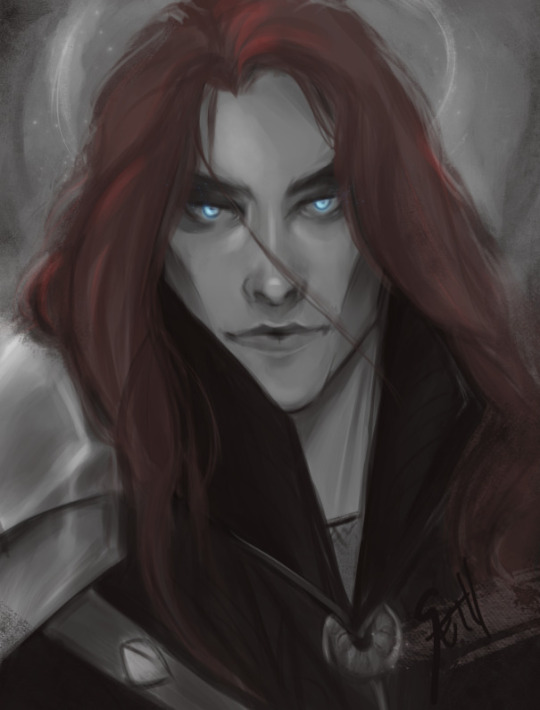
Maedhros by @kazz-art
(Fun fact: According to a YouTube video called “Types of Lord of the Rings Fans” by Generic Entertainment, “Maedhros” is composed of Sindarin words meaning “shapely” and “red-haired,” so it basically means “hot ginger.”)
Of course, the problem is that the Elves have never been unified, and they’re not about to start now. Fëanor’s sons (save Maedhros himself) hate basically everybody, and their shenanigans have burned too many bridges:
Orodreth is now king of Nargothrond after Finrod died, and he says that he’s never going to trust a son of Fëanor ever again. After Celegorm and Curufin’s attempted coup, who can blame him? A small group from Nargothrond, led by an Elf named Gwindor, come to aid Maedhros — but they go behind the king’s back.
Doriath is even more of a lost cause. King Thingol now has a Silmaril, and you know what that means — all of Fëanor’s sons (including Maedhros) are his enemies by default. Melian advises Thingol to surrender the Silmaril, just… y’know… to take that problem off their hands. But Thingol is offended by the Fëanorians’ arrogance, and he’s still very mad at Celegorm and Curufin for trying to steal his daughter. The Silmarils are also kind of like the One Ring, in that anyone who looks at them becomes obsessive and wants to keep them. So, instead of actually listening to his wife for once, Thingol sends the Fëanorians a note that says the Elvish equivalent of “come at me, bro.”
Maedhros carefully ignores Thingol’s threat, because he’s really trying to get everyone to work together. But those two assholes Celegorm and Curufin send Thingol a declaration of war. Thingol fortifies his kingdom and then just stays there, because his solution to everything is to isolate himself behind a magic wall and hope the danger doesn’t touch him. (That worked when Morgoth was a general threat to everybody, but not so much when other Elves want to kill Thingol specifically.) Thingol’s right-hand men, Mablung and Beleg, want no part in whatever shit is inevitably going to go down between Thingol and Fëanor’s sons. So, they’re given permission to leave Doriath (provided they don’t go to serve any of Fëanor’s sons). They go to Hithlum to serve Fingon, and then after that, no one enters or leaves Doriath.
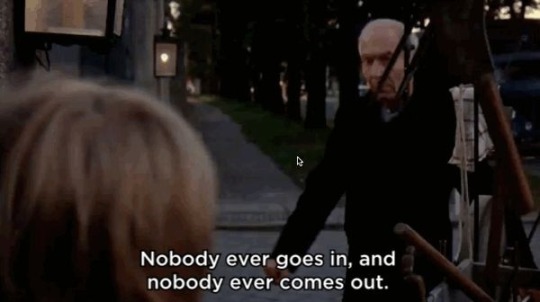
(I know, I know, I already used it!)
But Maedhros has a few unexpected sources of help. He manages to enlist the Dwarves, who have lots of weapons and the means to make them, and he also has the Men on his side. All of them want Morgoth gone as much as anybody (and they haven’t been given any reason to hate Fëanor’s sons yet). Maedhros also has Fingon’s support, because Fingon still loves Maedhros as much as he did back when he rescued Maedhros from the cliff face.
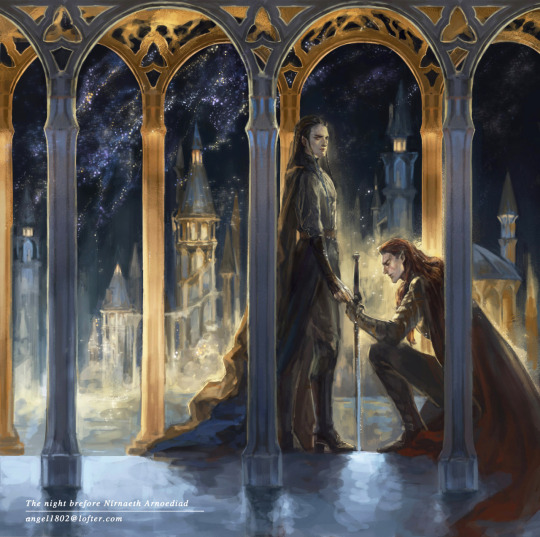
The Night before Nirnaeth Arnoediad, by @pansen1802
The only faction that remains unaccounted for is Gondolin, because it’s the only kingdom that’s even more isolated than Doriath. News of Maedhros’ attempt at unity reaches Gondolin, but King Turgon still refuses to do anything.
Maedhros’ force is smaller than he’d hoped, but better than nothing. It’s enough to get rid of most of the Orcs in northern Beleriand, and it might be enough to try assaulting Angband yet again. Maybe this time it’ll work! Unfortunately, Morgoth knew they were coming. Before the battle even starts, Maedhros’ and co.’s chances are looking bleak. But at the last minute, the cavalry comes! Turgon finally decided to actually do something, and sent a host of ten thousand Elves from Gondolin to help. Fingon is overjoyed to have seen the first sign of his brother’s existence for centuries. He sends up a battle cry in Quenya. Morale is good! There’s a nice moment in which Fingon and Turgon briefly reunite on the battlefield.
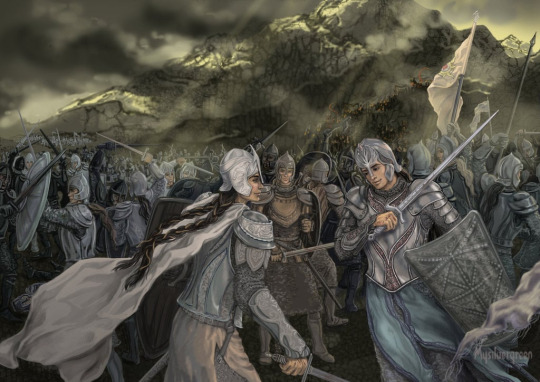
The Battle of Unnumbered Tears, by Mysilvergreen
Unfortunately, it’s all downhill from there. This battle is called Nirnaeth Arnoediad, “the Battle of Unnumbered Tears,” so that should tell you everything you need to know. Fingon’s host retreats, the Men from the Forest of Brethil are nearly wiped out, and then there’s betrayal. This whole time, Morgoth had been trying to wage a psychological battle amongst the Elves and Men, sewing distrust amongst them and making it even harder for Maedhros to get them to come together. “Divide and conquer” has worked well in the past, and it works again here. A man named Ulfang and his sons suddenly turn against Maedhros. Maedhros’ host is cornered, and they’re forced to retreat.
The most steadfast fighting force in the battle turns out to be the Dwarves. If it weren’t for them, the Elves and Men would have been annihilated by Glaurung and the other dragons. A Dwarven lord named Azaghâl manages to stab Glaurung in the underbelly, which wounds him, but doesn’t kill him.
Finally, Gothmog, the Lord of Balrogs, comes out of Angband. He corners Fingon with another Balrog. Fingon fights valiantly, but no one can hold out against the Lord of Balrogs for long. Gothmog cuts Fingon in half with a greataxe. The Elves say that a white flame burst from Fingon’s helmet as it was cloven.
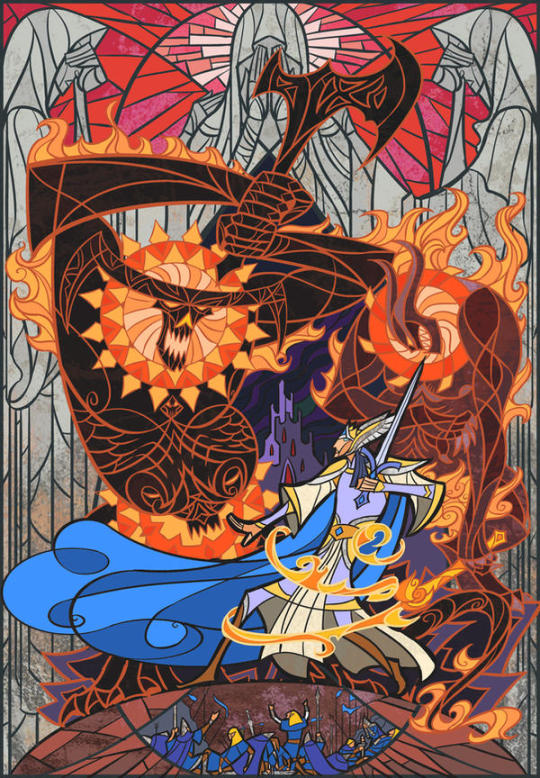
The Final Battle in Unnumbered Tears by breath-art
The battle’s basically over after that. Turgon holds out with the brothers Húrin and Huor to ensure that Morgoth doesn’t win the Pass of Sirion and take control of the river. Húrin tells Turgon to flee, because he’s the last hope for the Elves’ survival. But Turgon recognizes that by sending help, he revealed to Morgoth that Gondolin exists. It won’t take him long to find Gondolin and destroy it. Húrin tells Turgon that Gondolin will still be a beacon of hope for however long it continues to last, and says goodbye, knowing that they won’t see each other again.
Maeglin, Turgon’s nephew (the edgy Elf) is fighting nearby. He hears Húrin say that Gondolin is a beacon of hope, tucks it away in his mind, and says nothing. Ominous.
Turgon retreats, but the Men remain to hold the pass. Tolkien writes that, of all the deeds of Men that were performed for the sake of Elves, this is the most renowned. Some Men betray the Elves, but most of the Men continue to fight for them. Huor and all of the other Men die; Húrin is the last man standing. Húrin yells “Day shall come again!” every time he kills a monster, but the Orcs just keep coming, and they continue to fight him even after he cuts off their arms.

Exactly like this.
Eventually, Húrin is captured alive.
Morgoth is very pleased with himself for having engineered a betrayal. The Elves no longer completely trust the Men, except for the Three Houses that became their friends. Now that Fingon is dead, his realm of Hithlum is completely destroyed. The remaining Noldor of Hithlum (and there aren’t many) scatter, and join the Wood Elves of the East. Living in forests and using guerilla tactics are way less noble than having cities and fighting in armies. The Haladin, the Men of the Forest of Brethil, are also greatly reduced. They never see any member of their host again, or learn what happened to them. Morgoth shuts the treacherous Men in what’s left of Hithlum, forbidding them to leave it, which pisses them off because they wanted to rule Beleriand. Welp, that’s what you get for being a traitor.
One of the only safe places left in Beleriand is the Havens at the mouth of the River Sirion, but Morgoth is eventually able to ransack the Havens using machines with engines (remember, Tolkien thinks industrialization is evil). A handful of Elves, led by Círdan and Gil-galad, manage to escape by sea. They keep a foothold at the mouths of Sirion, but for the most part, Morgoth controls the river.
The situation is so dire that Turgon reaches out to Círdan from Gondolin. He wants to again try to send messengers across the sea to Valinor. Círdan builds ships and sends them west, but again, none of them return… except one. That ship turned back, and sank in a storm within sight of Middle-earth’s coast. One Elf from that ship survives, and he’s ferried to shore by Ulmo, the Vala of Water himself
Although Morgoth won decisively, he’s still not happy -- he wants to capture Turgon, and has no idea where he is. Turgon is the last remaining son of Fingolfin, and therefore the rightful High King of the Noldor. Morgoth’s hatred of the House of Fingolfin is personal, because Fingolfin wounded him, and because they’re friends with Ulmo the Vala. Morgoth also got bad vibes from Turgon all the way back in Valinor. He intuited that Turgon was destined to help destroy him.
Morgoth knows that Húrin is friends with Turgon, and Húrin is his prisoner. He demands that Húrin tell him where Turgon is, but Húrin tells him where he can stick it. In response, Morgoth binds Húrin to a chair on top of Thangorodrim, and curses him and all of his offspring. Morgoth tells Húrin that despair and sorrow will come to everyone he loves. To stick the knife in and twist it, Morgoth gives Húrin a taste of his own power to see the future, and forces him to remain sitting in that chair until all of his family have met their doom. Húrin does not beg for mercy for himself or any of his kin. He won’t give Morgoth the satisfaction.
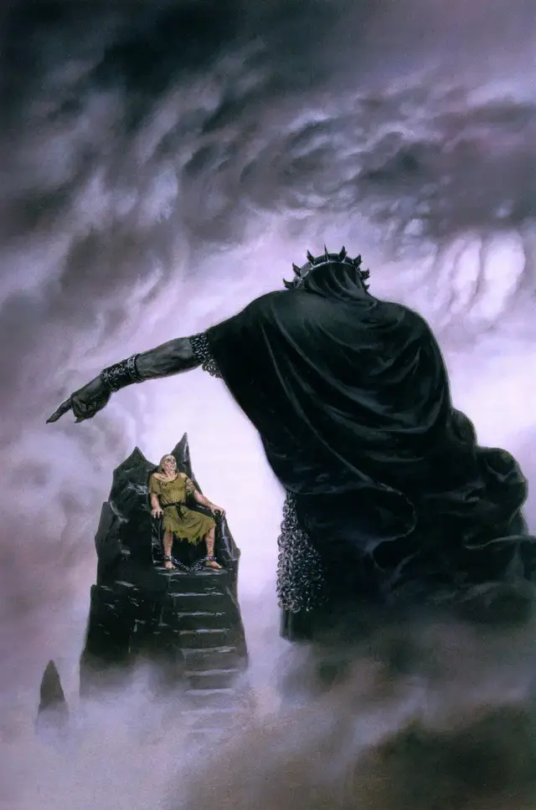
Morgoth punishes Húrin by Ted Nasmith
As a final insult, Morgoth has the Orcs build a giant mount of bodies in the middle of the battlefield. The Elves call it the Hill of the Slain and the Hill of Tears. But after a while, grass and flowers grow on the bodies of the dead.
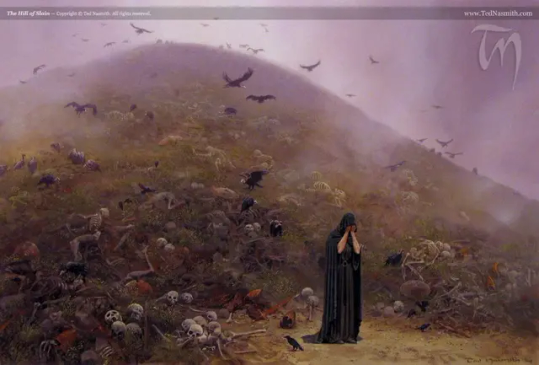
The Hill of the Slain by Ted Nasmith
Chapter 21: Of Túrin Turambar, Part 1. In which our angsty tragic hero tries to outrun his curse, kills people he shouldn’t, sleeps with people he shouldn’t, and fights a dragon.
This is the second of the Great Tales, also called “The Children of Húrin.” I’ve heard that this is one of the most tragic stories in the entire Tolkien Legendarium (which is saying a lot), so brace yourselves! This is going to be another two-parter, because I ran out of space.
Instead of jumping right into the story, Tolkien gives us an account of what happened to Húrin and Huor’s wives, Morwen and Rían. Rían is dead. Huor and Rían’s son is Tuor, and Húrin and Morwen’s son is Túrin. Húrin and Morwen also had a daughter, Lalaith, but she died of disease when she was three. After the battle, the Easterlings (evil Men working for Morgoth, they’re already called that) ransack Hithlum. They enslave everybody except Morwen, because she’s just so beautiful. They assume that she’s a witch, “in league with the Elves.” Despite their fear of her, Morwen decides that her son is not safe, and sends Túrin to Thingol. Morwen is Beren’s distant cousin, so she hopes that Thingol will take Túrin in. After Túrin is sent away, Morwen gives birth to a third child, a daughter named Nienor (which means “mourning.” That’s not ominous at all). Thingol accepts Túrin into his household, because he doesn’t hate Men as much as he used to, and raises him as his own son.
Germanic Fun Fact #1: It was actually a common practice in the early Middle Ages that noble children would be fostered by other families, and it shows up in fiction. For example, Beowulf was fostered by King Hrethel of the Geats, making him a de facto prince.
Túrin lives in Thingol’s court for nine years, and messengers occasionally bring him news of his mother and sister. One day, the messengers stop coming. Túrin puts on his ancestral family helmet, “the Dragon-helm of Dor-lómin,” and goes to battle alongside the king’s captains and the other Elves.
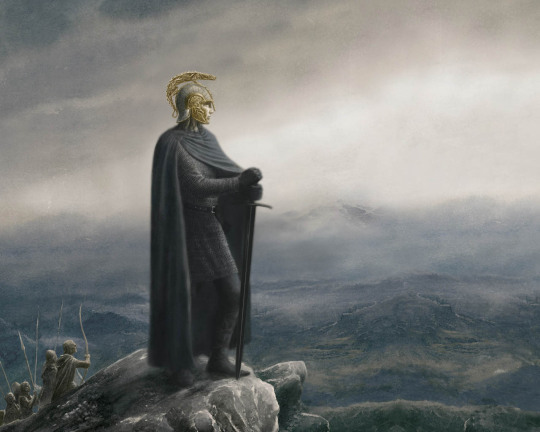
Túrin Turambar by Alan Lee
Túrin stays in the field for three more years, then returns to Menegroth. He looks dirty and unkempt because he’s been living in the wilderness for three years. One of the Elves of Thingol’s court, named Saeros, mocks Túrin for his wild appearance: “If this is what the Men look like, then do their women run like deer, wearing nothing but their hair?” In response, Túrin throws a goblet at Saeros, injuring him. The next day, they confront each other in the forest. Túrin defeats Saeros, and sends him running naked back to Menegroth, wearing nothing but his hair. Irony! As he flees, Saeros falls into a gorge and dies. Now Túrin is responsible for the death of one of Thingol’s courtiers. Oops.
Mablung, one of the king’s captains, advises Túrin to go back to Menegroth and beg Thingol for his pardon. Túrin decides to leave Doriath as an exile, but Thingol pardons him anyway.
He loved Túrin like a son, and would welcome him back if he decided to return. The king’s other captain, Beleg Cúthalion, loved Túrin just as much, and decides to go after him.
In the meantime, Túrin becomes the leader of a group of outlaws. And not the Robin Hood kind. He starts calling himself Neithan, which means “the Wronged.” (Thingol pardoned him, so he hasn’t been “wronged” at all. This is entirely his own fault.) After a year, Beleg finally finds Túrin’s outlaw lair. Túrin didn’t happen to be there at that moment, so the other thugs seized and bound Beleg, assuming that he was a spy from Thingol. When Túrin gets back, the sight of Beleg bound in his lair makes him suddenly repent of all his evil deeds, yada yada, and he swears to never again harm anyone besides Morgoth’s minions. Let's see if that promise lasts more than five minutes.
Beleg tries to convince Túrin to return to Doriath. He’s been pardoned, so he has no reason to hide out in the wilderness. Túrin is too proud to come crawling back, though. He tries to get Beleg to stay with him, but Beleg is tired of his nonsense and tells Túrin to find him on the front lines if he really wants to be with him. They go their separate ways. Túrin heads out towards Amon Rûdh (“Bald Hill”), a large hill overlooking the Forest of Brethil
Beleg returns to Menegroth and tells Thingol everything that happened (except for the part where he was tied up by Túrin’s thugs). Thingol just sighs and says, “What more would Túrin have me do?” Túrin is a hotheaded teenager who ran away from home, leaving his adoptive parents exasperated. Beleg offers to follow Túrin and protect him from a distance. Thingol gives him leave to go, and as a reward for his service, offers him anything he wants. Beleg asks for a fine sword. The king offers him any sword in his armory, save his own. Beleg chooses a sword called Anglachel, made from a meteorite. (Space Sword!) That means that its blade is ominously jet-black. It’s one of two swords made from the same meteorite by Ëol, the Elf of the Dark Forest. (Remember him? He was Aradhel’s abusive husband, and followed her to Gondolin, where he was killed by being thrown from its walls.) Thingol got one of the meteorite swords as payment for letting Ëol live on his land. Ëol’s son Maeglin has the other one.

Anglachel by Elena Kukanova (Thingol is portrayed with blonde hair here.)
As Thingol presents Beleg with the sword, Queen Melian stops to say that the sword “has malice in it.” If you haven’t noticed by now, any work of craftsmanship in Tolkien’s world is imbued, to at least some extent, with the personality of its creator — the One Ring, the Silmarils, the swan ships, and the Two Trees themselves. This sword is no exception. It absorbed all the bad vibes from Ëol. Melian says that it will serve Beleg begrudgingly, and he’ll end up losing it.
In light of that, Melian decides to give Beleg another gift: lembas bread. In the First Age, Melian was the only person with the authority to give out lembas. The leaves it’s wrapped in are marked with her seal, a white flower of Telperion (the Silver Tree). Melian gives Beleg the lembas with the expectation that he will share it with Túrin, which is a big deal — it’s the first of the very few times that Elves have ever shared their waybread with Men. Beleg leaves with the gifts, and spends the winter keeping the Orc population in check. Once spring comes, and the Orcs are no longer an immediate threat, he goes off to find Túrin.
Germanic fun fact #2: Waybread (wegbræde) is actually the Old English name of a broadleaf plantain, a type of edible plant. Tolkien decided to make it into literal bread.
Meanwhile, Túrin and his gang come across three Dwarves. They capture one of them, and one of the Men, Andróg, shoots after the other two. The arrow goes into the dark, and the Men can’t see if it hit or not. The captured Dwarf’s name is Mîm, and he offers to show Túrin his secret cave in exchange for his life. Túrin pities him, and spares him. (Túrin kind of swings back and forth between doing evil things and then regretting it.) Mîm leads the Men up the slope of Amon Rûdh to his secret cave, which “will be” called the House of Ransom. There are red flowers all over the hill, and one of the Men remarks that it looks like there’s blood on the hilltop. That may as well be a massive ‘FORESHADOWING’ sign.
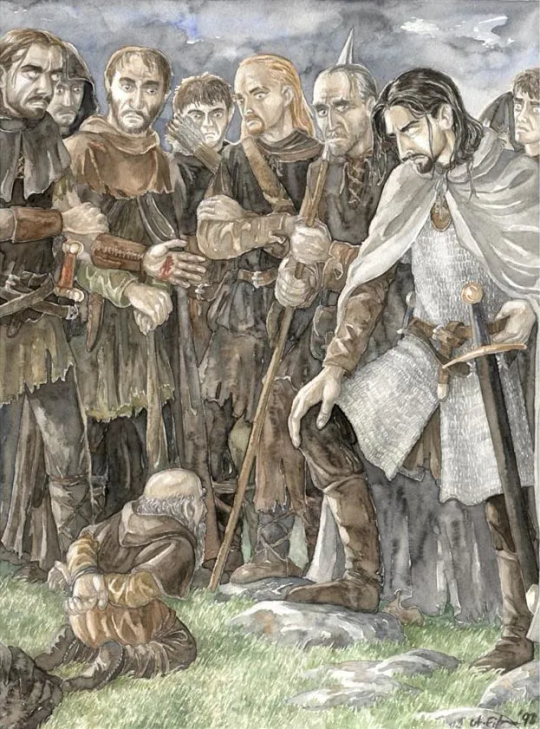
Mîm the Dwarf by Anke Eißmann
Inside the House of Ransom, Mîm shows the Men the body of his son Khîm (Dwarves really like rhyming names), who was shot and killed a few minutes ago. The arrow that Andróg shot into the dark killed Mîm’s son. Oops. What a way to guilt-trip the Men. Túrin feels horrible (you’d think after Saeros he’d learn not to be so reckless). He takes responsibility for Andróg’s arrow, and offers to pay Mîm a ransom of gold for his son. That validates the name of the House.
Germanic fun fact #3: A ransom paid as compensation for someone’s life is called weregild. This was a normal part of life in Germanic cultures. It was a way of preventing endless back-and-forth feuding between families. The gold guarded by the dragon Fafnir in Germanic mythology is weregild that the Norse gods themselves paid to a Dwarf for the murder of his son. (That story shows up in the Prose Edda and the Volsung Saga, parts of it are also in the Poetic Edda, and it’s referenced elsewhere.) Tolkien is definitely referencing that story here.
Mîm is impressed by Túrin’s speech, remarking that he sounds like an ancient dwarf lord, and forgives him to a point, saying that he doesn’t need to pay a ransom after all. He lets Túrin and co. stay in his house for as long as they need.
Now for a little bit of Dwarf history (we’ve had a lot of Elf history, so we need some Dwarf history): The Dwarves that live in the House of Ransom are called “Petty-Dwarves,” which means they’re less cool than other Dwarves. They were banished from the old Dwarf kingdoms in the Misty Mountains, and made their way west to Beleriand. They’ve slowly become shorter and less talented smiths, and they live in secrecy, which Tolkien thinks is ignoble. The Elves used to hunt them for sport, until the other groups of Dwarves showed up. So, the Petty-Dwarves hate Elves even more than they hate Orcs, and they especially hate the Noldor. The Petty-Dwarves originally discovered the caves of Nargothrond before Finrod took it over and forced them out. By now, the Petty-Dwarves have dwindled and basically lost all relevance. Mîm is one of the last and one of the oldest ones left.
In the harsh cold of winter, a hulking man arrives at Amon Rûdh. The Men all spring up to fight, but the man turns out to be Beleg Cúthalion. He only appeared to be a hulking brute because he was wearing a big backpack under his cloak. Beleg and Túrin have a heartwarming reunion, and Beleg gives Túrin his old ancestral treasure, the Dragon-helm of Dor-lómion. Beleg hopes that the helm will remind Túrin that he’s better than this, that he could be something more than an outlaw living in a hole. But it doesn’t sway Túrin at all.
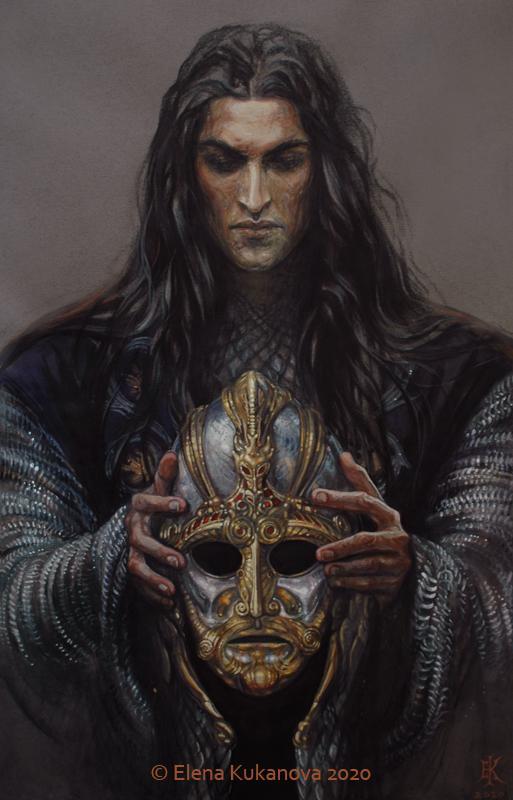
The Dragon-helm of Dor-lómin by Elena Kukanova (This artist’s design of the helm is based on a real Anglo-Saxon helm found at Sutton Hoo.)
Against his better judgement, Beleg stays with Túrin, purely out of love for him. He becomes the team medic, and uses the lembas that Melian gave him to heal sick and injured members of Túrin’s company. (Lembas apparently has healing powers at this point in Elven history.) Mîm the Dwarf is not happy about having an Elf living in his House. Men are one thing, but as I said before, the Petty-Dwarves have every reason to hate Elves.
Meanwhile, Morgoth is still a problem. Túrin and Beleg go out hunting Orcs, and they’re so good at it that they become living legends. Their land becomes known as “The Land of the Bow and Helm,” referring to Beleg’s archery skills and Túrin’s fancy Dragon-helm. Túrin starts calling himself Gorthol (“Dread Helm”), which is a little pretentious. Even the isolated Gondolin has heard of them! Of course, Morgoth eventually hears of them too, and he immediately knows who the fearsome “Dread Helm” is — it’s that upstart kid from the cursed bloodline! He starts laughing, and presumably sits back with his popcorn to watch the shitshow.
Mîm and his son Ibun are promptly captured by Orcs when they go out to forage for the winter. Mîm uses the exact same tactic that he pulled when Túrin and co. captured him — he promises to lead the Orcs to his secret cave, selling out Túrin to the Orcs. To his credit, Mîm does make the Orcs promise not to kill Túrin, but that doesn’t make much of a difference.
The Orcs kill most of Túrin’s company in their sleep. The rest flee to the top of the hill, but most of them are run down and slain, so that their blood covers the top of the hill like the flowers did. The Orcs actually keep their promise not to kill Túrin, and drag him away. Mîm returns to his House to find a massacre, which he’s not too torn up about, because he’s finally rid of the squatters. Everyone’s dead except for Beleg, who is badly wounded on top of the hill. Mîm takes Beleg’s cursed sword and tries to kill him, but Beleg has enough strength left to catch the sword and push it back. Mîm runs like a coward, and Beleg calls after him that Túrin will one day have his vengeance.
Beleg is a strong Elf who knows healing magic, so he slowly recovers. He searches among the corpses for Túrin’s body, hoping to bury him. When he doesn’t find it, Beleg realizes that Túrin is alive, and goes out to look for him a third time. You’ve gotta admire his devotion to this kid who’s a magnet for trouble.
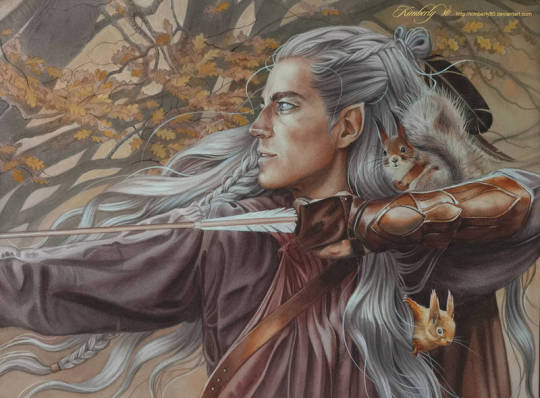
Beleg by kimberly80
Beleg follows the Orcs’ trail all the way to Taur-nu-Fuin, the Forest under Nightshade in the north near Angband. It’s a dark and scary place, but Beleg is such a badass that he can survive it. In the forest, he finds an Elf sleeping under a tree. After Beleg heals him and gives him some lembas, the Elf says that his name is Gwindor, one of the Elves from Nargothrond who went to fight with Maedhros in the Battle of Unnumbered Tears. Captured Noldor are put to work in Morgoth’s mines, since they’re skilled with metals and gemstones. (The Noldor yearn for the mines!!!) Gwindor managed to escape through a secret tunnel, and got lost in the evil forest.
Gwindor gives Beleg some intel about the Orc party he’s chasing, and tries to dissuade Beleg from following them. After all, he knows what awaits them in Angband if they get captured. But Beleg refuses to abandon Túrin, and Gwindor, having finally gotten a smidge of hope, decides to go with him.
Beleg and Gwindor sneak into the Orc camp at the base of the Thangorodrim and carry Túrin out without a hitch. But when Beleg goes to cut Túrin’s bonds with his cursed sword, he slips and snicks Túrin’s foot with the blade. Túrin wakes up to see someone bending over him with a sword, and freaks out, not realizing who it is. He grabs the sword and kills Beleg, his loyal friend who loved him so much that he repeatedly put himself in harm’s way for Túrin’s sake. A storm rages overhead, and a flash of lightning illuminates Beleg’s face. Túrin is completely distraught to see that he killed his friend, and collapses beside Beleg’s body.
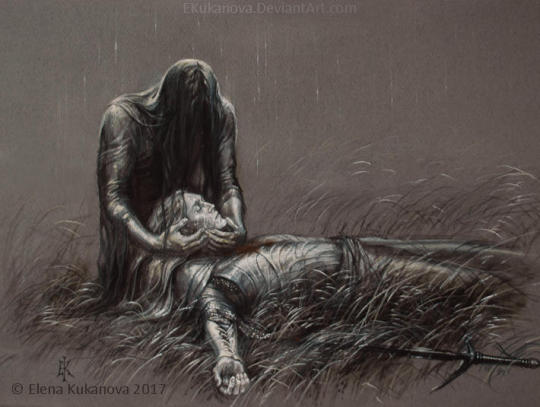
Death of Beleg by Elena Kukanova
In the morning, when the storm passes, Gwindor suggests that they bury Beleg. Túrin is still distraught, but helps bury him right in that spot. They bury Beleg’s bow with him, but take the lembas, and the meteorite sword. Gwindor thinks it’s a shame that such a fine sword should go to waste, and thinks it would be better used to kill the Orcs, and that’ll definitely come back to bite them later.
They go off together, but Túrin is so traumatized that he doesn’t speak. Gwindor looks after him until they reach a magic spring called Eithel Ivrin, which is blessed by Ulmo (the Vala of Water). Túrin drinks from the spring and finally speaks again. He composes a lay to honor Beleg’s life, and sings it at the top of his voice.
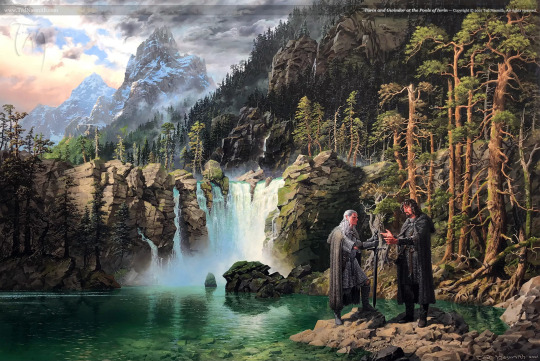
Túrin and Gwindor at the Pools of Ivrin, by Ted Nasmith
Gwindor gives Túrin the meteorite sword, and offers to take him back to Nargothrond. Since he can finally speak, Túrin asks Gwindor who he is, and Gwindor tells him that he’s a thrall who was “once” Gwindor son of Guilin. I think it’s interesting that Gwindor introduces himself this way — he no longer feels worthy of his former identity, and though he escaped Morgoth, he still identifies himself as a “thrall.”
Túrin also asks after his father Húrin. Gwindor doesn’t know any details, but he tells Túrin the rumors that Húrin is imprisoned by Morgoth and that his line is cursed. After everything that just happened, Túrin finds that completely believable.
As they continue to travel, Túrin and Gwindor are captured by Gwindor’s own people, the Elves of Nargothrond. They don’t recognize Gwindor at all — being a slave in Angband aged him prematurely, which doesn’t normally happen to Elves — so they assume that Gwindor and Túrin are spies. The first person to recognize Gwindor is the king’s beautiful daughter, Finduilas, because she was in love with him before he left. Gwindor is welcomed back into the fold. Túrin is allowed to stay, but he doesn’t give the Elves his real name.
Something about Túrin must be really appealing to Elves, because the Nargothrond Elves like him as much as Thingol’s Elves did. Also, Túrin has been a teenager this whole time, and only now does he reach manhood. (Actually, like Aragorn, he’s probably significantly longer-lived than the humans of today are. But still.)
Also, he’s really attractive, like his mother Morwen— he has pale skin and dark hair, gray eyes, and the prettiest face of any Man who’s ever lived. At first glance, you’d easily mistake him for one of the Noldor. (After all the pictures of him looking kind of like Aragorn or Boromir, that came as quite a shock.) I guess he cleans up nicely; he has been living in the wilderness for years.
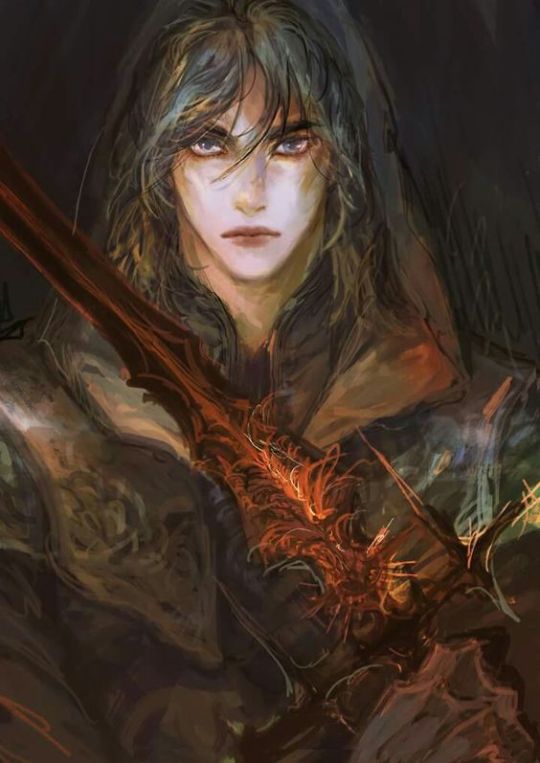
Túrin Turambar by @tolrone
The meteorite sword is reforged, and Túrin renames it Gurthang, “Iron of Death.” He’s so skilled with it that the Elves nickname him Mormegil, “The Black Sword,” which is pretty badass.
Finduilas unwittingly falls in love with Túrin, and out of love with Gwindor. Gwindor catches on, and doesn’t take it personally, but he warns Finduilas about what happened the last time an Elf and a Man fell in love. Túrin may look and act like an Elf, but he’s not one — he’ll die and leave Finduilas alone, and it’s vanishingly unlikely that Mandos will be willing to break the rules a second time. Also, Túrin is clearly cursed, and Beren didn’t have that problem. Gwindor also reveals Túrin’s real name, and tells Finduilas that if she gets mixed up with him, she’s guaranteed to feel the effects of the curse on his bloodline.
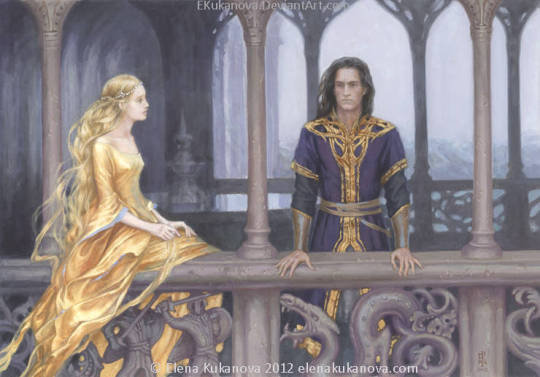
Nargothrond. Finduilas and Túrin by Elena Kukanova
Túrin is very mad that Gwindor revealed his true identity. Gwindor tells him that he’ll attract trouble no matter what he calls himself, so, there’s not much point in using aliases.
When Orodreth, the king, hears who Túrin really is, he’s perfectly happy to have a son of Húrin in his ranks. Túrin becomes more and more important in his court — so important, that he can completely overhaul their method of warfare. Remember, ever since Celegorm and Curufin’s attempted coup, the Nargothrond Elves have practiced mainly guerilla warfare, which is sneaky and dishonorable and all that. So now, because of Túrin, the Nargothrond Elves practice open warfare like civilized people. The disadvantage to this is that, now that the Nargothrond Elves are fighting out in the open, Morgoth knows where they are.
Gwindor is worried by how much influence Túrin has, and sounds the alarm, but no one listens to him anymore and he falls out of favor. Poor guy. He survives Angband, is nice to Túrin, gives him a place to live, and is repaid by Túrin stealing his honors and his girlfriend.
In the meantime Morwen, Túrin’s mother, takes advantage of the unexpected peace caused by her son’s decimation of all the Orcs in the area. She flees to Doriath with her daughter, expecting to find Túrin there. She grieves when she learns that Thingol’s court hasn’t heard from Túrin in years. (They actually have heard of “The Black Sword of Nargothrond,” but they have no way to know that it’s Túrin.) Thingol allows Morwen and her daughter to live in his court, and treats them like family.
Okay, I’m gonna stop there! More coming!
#the silmarillion#the silm#the silm fandom#the silm art#summary#tolkien#jrr tolkien#turin turambar#children of hurin#tragedy#beleg cuthalion#beleg#gwindor#finduilas#nargothrond#maedhros#battle of unnumbered tears#nirnaeth arnoediad#fingon#morgoth#hurin#nienor#germanic mythology#j.r.r. tolkien#middle earth#long post
43 notes
·
View notes
Text
Adding page numbers to a scientific paper is like wrestling a spooked horse that wants to kill you
25 notes
·
View notes
Text
dagor nírnaeth arnœdiad was one big wedding, and it's literally canon. you cannot prove me wrong.
LaCE takes precedence over NoME.
everyone got married except the balrogs. because of a legal technicality involving fanar. this is what they get for being úmaiar*!
“It was the act of bodily union that achieved marriage, and after which the indissoluble bond was complete.” —The Histories of Middle-Earth, Volume X: Morgoth's Ring, The Later Quenta Silmarillion (II); Laws and Customs of the Eldar (B), pg. 211
they called it the union of maedhros. the union of maedhros. and they all had bodies. and they all acted (v. sense 1). and because of the treachery of ulfang? the armies of angband were also part of this act of Bodily Union (or ig corporeal union). EVERYONE got married. except for the balrogs. and maybe the fire-drakes/dragons. that one's up for debate.
just imagine the chaos in mandos. i almost feel bad for námo.
#not to mention the psychic damage inflicted on those poor elves.#it's probably more traumatising to accidentally marry almost every living relative than it is to be flayed alive by balrogs tbh.#i mean id probably pick the balrogs‚ personally#also yknow how elf-marriage results in Increased Telepathy?#imagine hearing the thoughts of at MINIMUM like 40 000 people. thats just NASTY#i have not slept in 24 hours#and this brings out the BEST in me#next up will probably be the elf pregnancy post#sorry not sorry lmao#silm#the silmarillion#silmarillion#nirnaeth arnoediad#dagor nírnaeth arnoediad#the battle of unnumbered tears#union of maedhros#tolkien#laws and customs among the eldar#histories of middle earth#the histories of middle earth#morgoth's ring#elf marriage
20 notes
·
View notes
Text
2025 POETIC ASIDES APRIL POEM-A-DAY CHALLENGE: DAY 10
THOSE UNNUMBERED MILES © 2025 G. Smith (BMI) =================== Living out of a suitcase, Three days out of five, Might be making a living, But it’s no way of being alive.
Home’s not on the highway, Camping in some cheap motel, Making calls and walking halls, In this twenty-first century version of hell.
But still you wait for me at home, Always answer the telephone, Greet me at the door with a smile, That washes away those unnumbered miles, That washes away those unnumbered miles.
I’m halfway home as I leave the drive, And pull out on the open road, Thinking about when I get back, And putting down this heavy load.
The sun sets on another week, The time away is time that’s gone, And despite the nights and neon lights, The time with you is sweet and long.
Because still you wait for me at home, Always answer the telephone, Greet me at the door with a smile, That washes away those unnumbered miles, That washes away those unnumbered miles.
#2025 april poem a day challenge#2025 APRIL PAD#poetic asides#robert lee brewer#Number#Those Unnumbered Miles
9 notes
·
View notes
Text
How to draw Rabbits, Bunny & Hares


Credit: Etherington Brothers
#unnumbered#animal#animals#animal anatomy#rabbit#rabbits#hares#bunny#bunnies#art tutorial#drawing tip#art tip#art tips#art tutorials#drawing#drawing tips#drawing tutorial#drawing tutorials#art#tip
164 notes
·
View notes
Text
People hate on Elwing when Ulfang and his sons are right there. Reblog to agree on a common enemy.
#Defend them I dare you#men are literally free from the will of ilúvatar their betrayal was not only unhelpful it was uncalled for#Absolutely nobody wanted that. Why. Whyyy#Rereading of the fifth battle and you know kind of raging as one does#‘Some said even that the Eldar may yet had won the day had all their hosts been faithful’ screaming#silmarillion#silm#the silmarillion#the silm fandom#the silm#tolkien#silm fandom#jrr tolkien#Nirnaeth arnoediad#Unnumbered tears#Tolkien legendarium
47 notes
·
View notes
Text
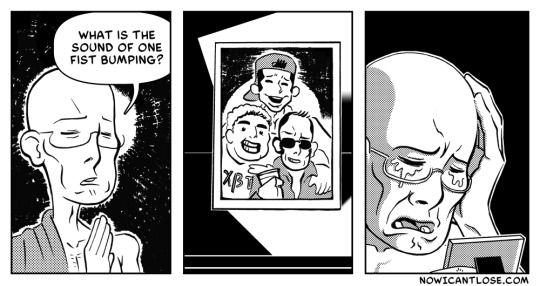
Unnumbered #1 Koan
Visit the website!
Join the mailing list for weekly updates!
Get the books!
5 notes
·
View notes
Text
here they are.

[ID: a digital drawing of two original Flatland characters, seen from above. One is named Jerult, whose pronouns are ey/em/eir/(eirs)/emself, who is an irregular kite, shaped like an Isosceles triangle, but with an extra stubby angle where the base would be. The other is named Cairis Garret, whose pronouns are he/him/his/himself, who is an Equilateral triangle. Both have thick black exoskeletons and purple insides, with their organs as large blobs in different shades of pink, purple, and red, with one single eye at one of their points. Jerult's is at eir stubby angle, and Cairis' is on one of his points. They both stare at eachother from a short distance away. End ID.]
Cairis is named after C'rizz for reasons that will become obvious, at least to other nerds who know who C'rizz is in the first place.
#Rjalker writes Neopronouns in Action#Neopronouns in Action unnumbered#Rjalker reads Flatland a Romance of Many Dimensions#Flatland#Flatlandaromanceofmanydimensions#Rjalker's OCs#Flatland OCs#Jerult the Irregular Kite#Cairis Garret the Equilateral Triangle
8 notes
·
View notes
Text
So, I was thinking about Battle of Unnumbered Tears and its effects (as you do), and I think that after Thrangorodrim the words "hope" and "Fingon" was synonyms in Maedhros' mind.
And then.
(also, I wonder whether Fingon knew, because of he did, that's a very emotionally difficult position to be in)
@dfwbwfbbwfbwf I'm not sure if this counts as "I agree with you about Mae having hope" or not, but it definitely feels relevant.
#silm#silmarillion#tolkien legendarium#the silm#the silmarillion#silm headcanons#silm hc#maedhros#fingon#battle of unnumbered tears#nirnaeth arnoediad#thrangorodrim
39 notes
·
View notes
Text
"Tears unnumbered ye shall shed; and the Valar will fence Valinor against you, and shut you out, so that not even the echo of your lamentation shall pass over the mountains. On the House of Fëanor the wrath of the Valar lieth from the West unto the uttermost East, and upon all that will follow them it shall be laid also. Their Oath shall drive them, and yet betray them, and ever snatch away the very treasures that they have sworn to pursue. To evil end shall all things turn that they begin well; and by treason of kin unto kin, and the fear of treason, shall this come to pass. The Dispossessed shall they be for ever. Ye have spilled the blood of your kindred unrighteously and have stained the land of Aman. For blood ye shall render blood, and beyond Aman ye shall dwell in Death's shadow. For though Eru appointed to you to die not in Eä, and no sickness may assail you, yet slain ye may be, and slain ye shall be: by weapon and by torment and by grief; and your houseless spirits shall come then to Mandos. There long shall ye abide and yearn for your bodies, and find little pity though all whom ye have slain should entreat for you. And those that endure in Middle-earth and come not to Mandos shall grow weary of the world as with a great burden, and shall wane, and become as shadows of regret before the younger race that cometh after. The Valar have spoken."
-- J.R.R Tolkien, Quenta Silmarillion --
.
#quotes#silmarillion#doom#mandos#doom of mandos#noldor#tolkien elves#unnumbered tears#nirnaeth arnoediad#jrr tolkien#fate
8 notes
·
View notes